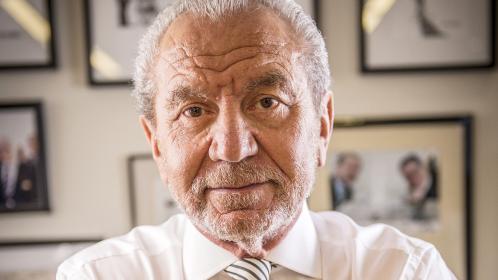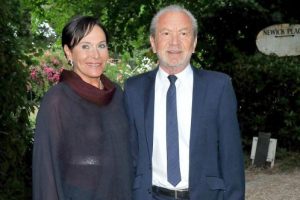
I smell millions as the next Mr Kipling
Oliver Thring meets Alan Sugar
Alan Sugar is not interested in making friends. “It’s business,” he grunts in his squat little office deep into Estuary Essex. “I’m not looking for mates. As you can imagine, a person in my position — with my wealth and on television — has a lot of people trying to become his friend. So I’m standoffish.”
How many friends does he have? “Maybe 10, going back to when I was 16. We meet up every so often. One’s a taxi driver, another works in a phone shop.”
I struggle to imagine what Lord Sugar, a billionaire who has not travelled on the Tube in a quarter-century and who has bought “loads” of planes over the years, could realistically have to talk about with these people. Would he ever call on them in a crisis?
“No.” So, if a calamity struck, who would he ring other than his wife? He thinks for a moment: “Her.” Does he have any friends that he could reach out to for help? “Not really, no.”
In fairness, Sugar’s shtick has never really been the grinning mateyness of Richard Branson (who is four times richer than he is). In fact, you expect and demand a bit of the grouch from Sugar, a Hackney barrow boy who failed the 11-plus, left school at 16 to flog TV aerials from the back of a van, then built his computer company, Amstrad, into a billion-pound business.
By the time he was 40 he was the 15th richest man in Britain, with a fortune of £600m. He sold the company in 2007 for £125m, a tenth of what the stock had been worth at its peak.
Nowadays most of his money comes from property — that side of his business is run by his son, Daniel — but of course he’s a true celebrity thanks to The Apprentice, the Donald Trump-produced, business-themed reality show on which he has barked “You’re fired!” for 12 very watchable seasons.
My personal tax bill was £56m. Many would go abroad to dodge that. But I love living in England
Last year’s winner, Alana Spencer, has just launched a cake business into which Sugar has poured £250,000 of his own money for a 50% stake. The venture was announced during the Apprentice final to a primetime audience of 6m on the supposedly advertising-free BBC1.
He appears not to have tasted the product he’s flogging. “I don’t have a sweet tooth,” he says, sinking into a chair in his office, which is a sort of Sugar shrine. Barely an inch of wall space is unadorned with a picture of him, a flattering cartoon or some other framed testament to his success. (His six Radio Times covers bedeck one wall.) “I’ve been told the cakes are brilliant if you like sweet things. But there’s a tremendous market here.”
Will he eventually make millions from cake? “I’m only interested in millions.”
Sugar turns 70 this week and a few months ago had a stent fitted in his heart. Yet he never stops to think about retirement or ageing. “That’s morbid,” he snaps. “I still feel 18. I’m fitter than most men my age; I do 60 miles on the bike, no problem.”
The face is wrinkled and he moves slowly but he has a presence to which money, fame and age have contributed. He’s gruff and charmless. This makes for excellent telly not only because he so comprehensively humiliates the unspeakable pillocks who turn up in the show but because he speaks good, commonsense English.

Ann and Alan Sugar: married for 49 years
He says he’s a “plain talker — and that’s why people like me. And I don’t just mean people watching TV — people who work for me as well. You know why? ’Cause you get a straight answer: good, bad or indifferent. I don’t flower my words. If business was easy everybody would be doing it.”
In his autobiography he wondered whether his “coldness . . . has something to do with my upbringing. I never experienced any warm feelings of closeness and caring from my parents.”
Nathan Sugar was a tailor in London’s East End, making £13 a week in 1963. “It was the sort of job they’d tell you on a Friday night not to come in on Monday — no work,” says Sugar. His father was too poor to afford a bar mitzvah party for his youngest son: Alan’s Jewish friends dropped him when they found out.
He was bullied at school, where the boys nicknamed him “Mopsy” for his curly hair and would yank down the trousers his dad had sewn for him. He was a grafter, though, and washed cars, bottled beetroot for the greengrocer, sold shampoo from a market stall.
He worked briefly as a statistician for the civil service. When he resigned, his father demanded what he would do when the next payslip didn’t arrive. By the age of 31, Sugar Jr was a multimillionaire.
The Sunday Times Rich List calculates his worth at £1.1bn — is that spot on? “If I had to sell everything today, no. If I took my time to get the best prices, you’ve underestimated.”
Does he feel overtaxed? “No, 45% is a fair rate.” And here he almost smiles. “My personal tax bill was £56m last year. Many people would go abroad and dodge that kind of tax. But I love living in England. And if you pay £56m, don’t forget about the £130m you’re left with.”
While he is quick to whip out his lawyers when he feels slighted, throughout his many dealings Sugar has never been accused of anything illegal or dodgy. Only last summer he won £20,000 in damages from a tabloid that had wrongly called him a “spiv”.
“I’ve been in business for 50 years,” he says, “and people have come up to me all the time offering schemes. Rubbish, every one of ’em. They always backfire and you get in trouble with the Revenue.”
He comes to the defence of his “mild friend” Sir Philip Green, the Topshop boss. After months of criticism over the collapse of BHS, which the retail tycoon sold for £1 in 2015, Green recently said he would pay £363m to plug the hole in its pension fund. Sugar thinks politicians have been too harsh.
“MPs who aren’t very brainy have picked on him because he’s a rich man,” he says. “He’s a good businessman who had a bad year. Move on.”
Sugar reads almost nothing except his emails and has no time for opera, “intellectuals” or anything of that sort. Instead, he comes alive when discussing EastEnders.
“Ian’s getting his scans,” he coos, “and I think he’s going to get a prostate cancer. I like to think about what’s in the writers’ minds. It’s going to be a prostate cancer next.”
He frets over Ian while at home in Chigwell, Essex, with Ann, his wife of 49 years. She used to be a hairdresser and her father had disapproved of the match; Sugar proposed to her in a minivan on the Stratford flyover.
Ann has never phoned him at work but once lost her temper when he signed her birthday card: “Best wishes from Sir Alan Sugar.”
Sugar was a big New Labour donor but resigned his membership of the party two years ago when it shunted leftwards; he dismisses “that Corbyn fella” as hopeless. Today he sits happily in the Lords as an independent.
He has a very thin skin. When he became rich, he says, he liked the fact that people started treating him “more respectfully”, which was “a boost to your ego”.
He still craves that validation — the office walls attest to it — and has admitted to giving the impression that anyone he disagrees with is “a tosser or a prat”.
Although he is capable of hard-heartedness — begging letters “get dumped in the bin” — he gives generously to the Great Ormond Street children’s hospital, Jewish Care and other charities.
It’s hard not to see him as a great testament to what hard work and discipline can achieve in this country. Sugar might be a grumpy no-mates but he is a deserved national treasure.






